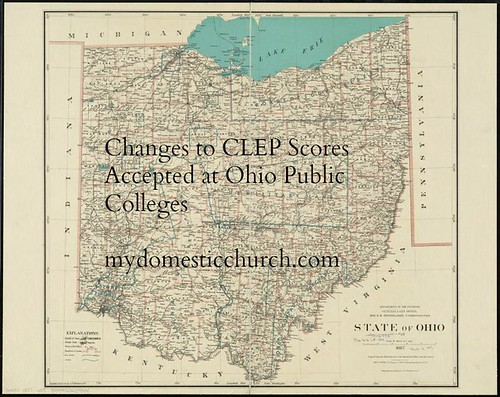Just to re-cap:
CLEP stands for College Level Examination Program. CLEP is administered by the College Board, and is a legitimate way of getting college credit in high school. It even has its own page on the College Board Site. The idea is, that if you are already well versed in a certain subject, you can take the CLEP test on that subject and if you pass, you get college credit. If your college accepts the CLEP test results, you just saved yourself a lot of time and money.
This is a nice option for a number of reasons:
- Students who do not get a lot of credits through the state’s College Credit Plus Program, can still earn college credit cheaply.
- It allows a student to study independently and take the test whenever he feels prepared.
- Studying for CLEPs can work seamlessly with a home school lifestyle without having to enroll in public or charter school for college credits.
- CLEP is not free, but at $100 per test, it is still a great deal compared to the average college credit costs.
There’s been an interesting development in the CLEP program and Ohio Public Colleges. The Ohio Higher Education Department has implemented a program this year regarding CLEP acceptance at state colleges. It is a three-phase program with the last phase to be in place by 2018.
I’ll bottom line in for you – they’re raising the minimum score required on the CLEP test for college credit. Where as a score of 50 was the standard accepted score indicating a pass, 54 or higher seems to be the more accepted score in most subjects. This varies from school to school, but all of the scores have been raised.
This will affect all students this fall (2017) enrolled in public institutions of higher education who have NOT had their CLEP scores evaluated for college credit for at least 12 of the exams.
- American Government
- Biology
- French
- History of the United States I and II
- Introduction to Psychology
- Introduction to Sociology
- Macroeconomics
- Microeconomics
- Spanish
- Western Civilization I and II
It is interesting to speculate on the reason for this. It could be that the ODHE just wants to make sure it has the impeccable standards. But I’m guessing that funding has more to do with it as well as a desire to funnel more students into the College Credit Plus program.
I reviewed my student’s scores in passed tests. They could have passed Biology easily and the American History with a slim margin with the new guidelines. It is achievable. Students should be aware of this on their practice exam and aim for a score in the high to mid-60s. Interestingly, Spanish, French, and German seem to have the most rigorous requirements along with Finance and Marketing.
So what does this mean going forward for homeschooled students or any high school student looking to gain credit via CLEP tests?
- Compare institutions. While all public institutions have to go with the new guidelines, some schools are asking for higher scores than others.
- Study hard. When I questioned my son Noah about studying for the CLEP in biology and American History, he told me that although he used Instantcert and the CLEP Test Prep Book, he didn’t study every day or as hard as he could have. In fact, he coasted on a lot of the information he already knew from high school. A little more effort could have easily put him over 60 on both tests.
- Prepare in jr. high. It’s not too early to ingrain those language, math and history skills in jr. high so that after some high school prep, a passing CLEP test score is more attainable.
- Currently, this is not affecting private schools in Ohio, and although those price tags may seem high, a good SAT or ACT score coupled with some passing CLEPs can easily put those within financial reach too.

